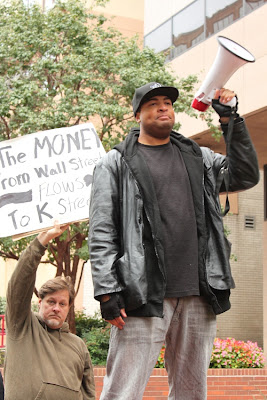After more than a month of systematic police brutality across the nation, police in Oakland, California ratched up the repression of peaceable assembly and free speech. Using tear gas, rubber bullets and flash grenades, police in riot gear brutally dispersed nonviolent demonstrators. Among those injured in the attacks was Scott Olsen, a 24-year-old veteran of the war in Iraq, who was critically wounded when a police officer shot him in the head with a tear gas canister.
Here at Occupy DC, we have been extremely fortunate in our good relations with the several police services that operate in our city. Our interactions with police have been generally cordial, and we have not felt threatened in any way. The police violence that our friends in Oakland - and many other cities - are suffering stands in stark contrast to our experience here in DC.
Nevertheless, the crack-down in Oakland has struck a nerve here. We have seen images out of Oakland that make us wonder about the direction our country is choosing. For many, these images have reenforced preexisting wounds (literal and figurative) and anger surrounding police. Many of us are very angry.
This came to the surface on Wednesday night, when folks at Occupy DC rallied in solidarity with our brothers and sisters in Oakland. Folks at the rally were fired up, furious about what had gone down in California. When the police arrived, some of our young men had to be physically impeded to keep them from picking fights with the officers. Lots of emotion; lots of testosterone.
As the repression of this movement grows more serious, it is crucial that we re-commit ourselves to unconditional nonviolence as a movement. The nonviolent occupations around the world are a severe challenge to the powers that be; however, any hint of violence on our part will undermine all the gains we have made. Our moral authority depends on our willingness to be struck rather than to strike; to receive injury rather than to injure. Ultimately, our authority can only be founded on truth and love.
We occupiers are really good at the "truth" part. Most of us have highly developed analyses of the problems facing our country. We do a good job at pointing out what is wrong. But love is harder. Love requires us to lay down our own selfish interests and act for the sake of others. It means seeing the reality of God's love for others, even those who want to do us harm. Real love goes far beyond strategic nonviolence.
When we are grounded in love, we seek the spiritual and physical wholeness of every person. Love empowers us to see the broken humanity of each individual, and to have mercy on each one for Jesus' sake. When we are living in both love and truth, we are able to stand firm in the face of violence without needing to retalitate. We recognize that the violent person is sick - alienated from the love of God - and that we are called to reach out to them with mercy.
To be loving, however, does not require us to be naïve. We understand that the police - and, more importantly, the powers that give them orders - are not seeking our best interests. We understand that the powers are trembling, and that they are willing to do us harm in order to maintain their privilege. We have no illusions about the ultimate allegiance of the police.
But we must love them. It has been pointed out that police are also part of the 99%. Far more important than this, police officers are also children of God. Just like us, they are in desperate need of God's mercy and love. I pray that rather than falling into the trap of fear and hate, we will imitate Jesus who prayed for those who crucified him: "Forgive them, Father, for they do not know what they are doing."































